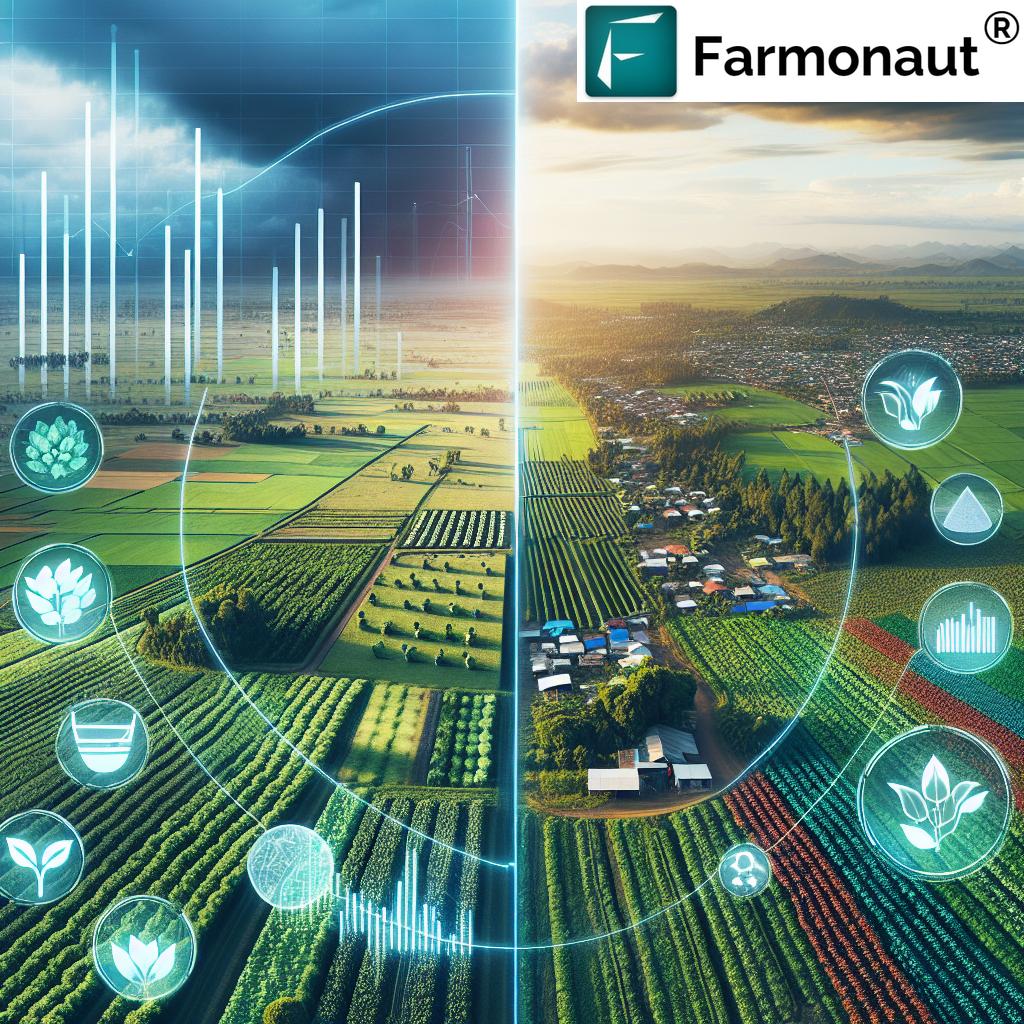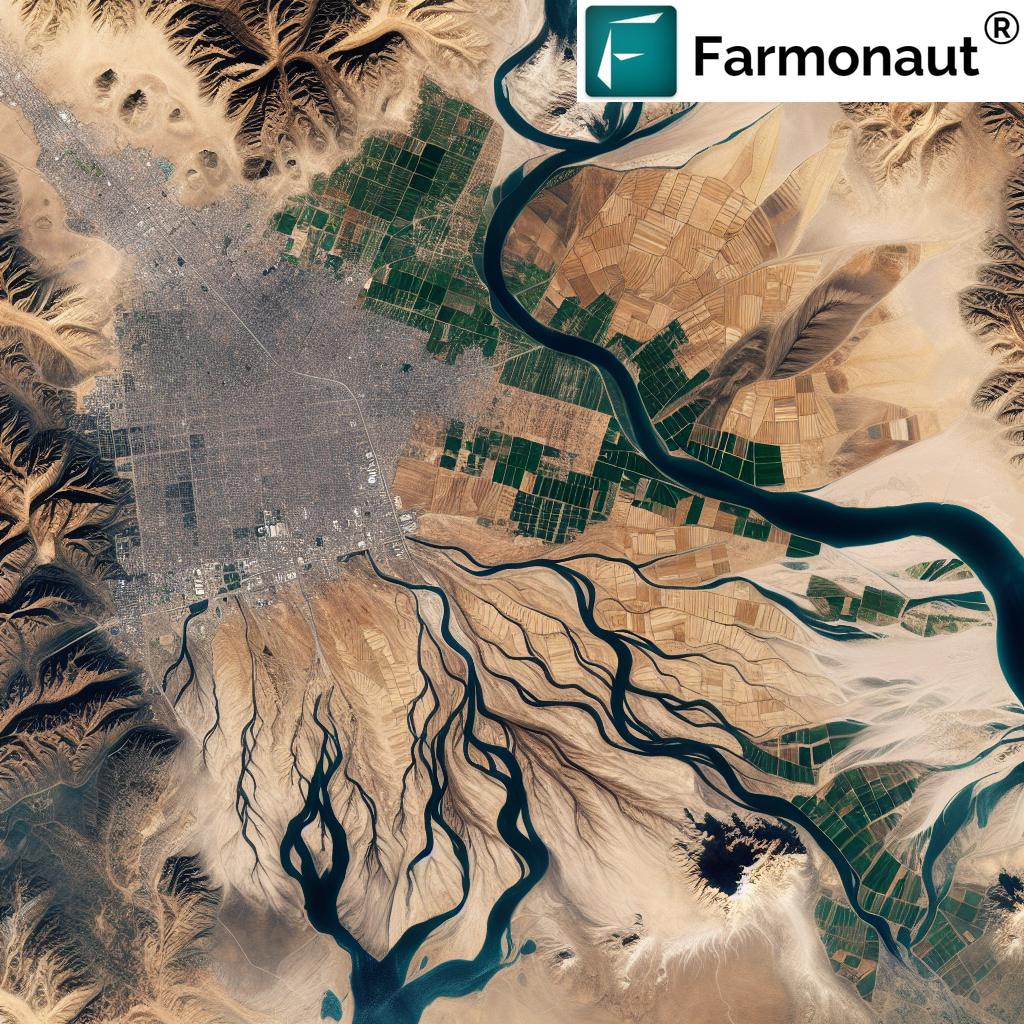Boosting Agricultural Productivity: How Precision Farming and Remote Sensing are Revolutionizing India’s Fertilizer Industry

“India’s fertilizer industry, worth over $12 billion annually, is being transformed by precision farming and remote sensing technologies.”
In the ever-evolving landscape of Indian agriculture, we are witnessing a remarkable transformation driven by the synergy of precision farming and remote sensing technologies. This revolution is particularly evident in the fertilizer industry, where companies like Rashtriya Chemicals and Fertilizers (RCF) are at the forefront of change. As we delve into this comprehensive analysis, we’ll explore how these cutting-edge technologies are reshaping agricultural practices, optimizing fertilizer use, and ultimately boosting productivity across India’s vast farmlands.
The Rise of Precision Agriculture in India
Precision agriculture has emerged as a game-changer in the Indian farming sector. By leveraging advanced technologies such as satellite imagery, IoT sensors, and AI-driven analytics, farmers can now make data-informed decisions about crop management, resource allocation, and fertilizer application. This shift towards precision farming is not just a technological upgrade; it’s a fundamental change in how we approach agriculture in a country where farming is both a economic backbone and a way of life.
At the heart of this agricultural renaissance is the fertilizer industry, which plays a crucial role in ensuring food security and agricultural productivity. Companies like RCF are adapting to this new paradigm by focusing on the production of urea and complex nutrients, which are essential for precision nutrient management in crops.
Remote Sensing: The Eyes in the Sky for Indian Agriculture
Remote sensing technology has become an indispensable tool in modern agriculture, particularly in a country as vast and diverse as India. Satellite-based observations provide farmers and agronomists with invaluable data on crop health, soil moisture levels, and potential pest infestations. This information allows for targeted interventions and optimized use of resources, including fertilizers.
We at Farmonaut have been at the forefront of this technological revolution, offering advanced satellite-based farm management solutions. Our platform integrates multispectral satellite imagery with AI-driven analytics to provide farmers with actionable insights for better crop management and resource utilization.
The Impact on Fertilizer Demand and Usage
The adoption of precision farming techniques has had a significant impact on fertilizer demand and usage patterns in India. With more precise application methods, farmers can now optimize their fertilizer use, reducing waste and improving efficiency. This shift is reflected in the market dynamics of companies like RCF, which have seen robust revenue growth driven by the increasing demand for specialized fertilizers tailored for precision agriculture.
Key factors influencing fertilizer demand in India include:
- Growing adoption of precision farming techniques
- Increasing awareness about soil health and nutrient management
- Government policies promoting balanced fertilizer use
- Rising demand for high-yield crop varieties
Urea and Complex Nutrients: The Powerhouses of Indian Agriculture
“Urea accounts for approximately 60% of India’s total fertilizer consumption, playing a crucial role in crop yield optimization.”
Urea remains the most widely used fertilizer in India, accounting for a significant portion of the country’s total fertilizer consumption. However, the precision farming revolution is driving a shift towards more balanced nutrient management. Complex fertilizers, which contain a mix of essential nutrients, are gaining popularity as farmers seek to optimize their crop yields through precise nutrient application.
RCF’s focus on producing both urea and complex nutrients positions it well to cater to this evolving market demand. The company’s strategic approach aligns with the broader trend of sustainable and efficient fertilizer use in Indian agriculture.
Technological Innovations Driving Fertilizer Efficiency
The integration of technology in fertilizer application has led to remarkable improvements in efficiency and sustainability. Some of the key innovations include:
- Variable Rate Technology (VRT) for precise fertilizer application
- Soil sensors for real-time nutrient level monitoring
- Drone-based fertilizer spraying for hard-to-reach areas
- AI-powered crop models for optimized fertilizer recommendations
These technologies not only improve fertilizer efficiency but also contribute to sustainable farming practices by reducing environmental impact and improving soil health.
The Role of Agricultural Policies in Shaping the Fertilizer Industry
Government policies play a crucial role in shaping the fertilizer industry and promoting sustainable agricultural practices. In India, recent policy initiatives have focused on:
- Promoting balanced fertilizer use through subsidy reforms
- Encouraging the adoption of precision farming techniques
- Supporting research and development in advanced fertilizer formulations
- Implementing soil health card programs for better nutrient management
These policies have a direct impact on companies like RCF, influencing their production strategies and market positioning. As the government continues to push for more sustainable and efficient agricultural practices, we can expect further evolution in the fertilizer industry.
Market Analysis: RCF’s Performance in a Changing Landscape
RCF’s recent stock performance offers valuable insights into the current state of the fertilizer industry in India. Despite broader market pressures, RCF shares have shown notable strength, reaching an intraday high of Rs 187.90. This performance is indicative of the robust demand for fertilizers and the company’s strong market position.
Key factors contributing to RCF’s performance:
- Solid technical signals with strong support at Rs 175
- Robust revenue growth driven by increasing fertilizer demand
- Focus on urea and complex nutrients aligning with market trends
- Improved operational efficiencies enhancing profitability prospects
Technical Analysis: Decoding RCF’s Stock Movements
A closer look at RCF’s technical indicators reveals interesting patterns that investors and market analysts should consider:
- Consolidation Phase: The stock is currently in a consolidation phase, trading within a narrow range.
- Bullish Engulfing Pattern: A recent bullish engulfing candlestick pattern suggests potential upward momentum.
- Fibonacci Levels: Key support levels are observed at Rs 182.00 and Rs 175.00, with resistance projected at Rs 190.00 and Rs 198.00.
- Volume Analysis: Increased trading volume, particularly in the last hour of sessions, indicates strong investor interest.
These technical indicators, combined with fundamental analysis, provide a comprehensive view of RCF’s market position and potential future movements.

Investor Perspectives: Evaluating RCF as an Investment Opportunity
For investors considering RCF, there are several factors to weigh:
- Dividend Yield: RCF offers a modest dividend yield of 0.67%, which may appeal to income-focused investors.
- Growth Potential: The company’s focus on essential fertilizers positions it well for future growth in the agricultural sector.
- Valuation Concerns: Some analysts, like ICICI Securities, advise caution due to current high valuations.
- Operational Efficiencies: Improved efficiencies are expected to contribute to better profitability in the future.
While there is cautious optimism surrounding RCF, investors should carefully consider these factors along with their own investment goals and risk tolerance.
The Future of Fertilizer Industry: Trends and Predictions
As we look to the future of the fertilizer industry in India, several trends are likely to shape its trajectory:
- Increased Adoption of Smart Farming Solutions: The integration of IoT, AI, and big data in agriculture will drive demand for specialized fertilizers.
- Focus on Sustainable Formulations: Environmental concerns will push for more eco-friendly and efficient fertilizer formulations.
- Precision Application Technologies: Advancements in application technologies will further optimize fertilizer use and reduce waste.
- Market Consolidation: We may see increased consolidation in the industry as companies seek to leverage economies of scale and technological capabilities.
The Role of Technology Companies in Agricultural Transformation
Technology companies like Farmonaut play a crucial role in driving the transformation of agriculture. Our satellite-based farm management solutions provide farmers with valuable insights that help optimize crop yields and resource utilization. By leveraging advanced technologies such as AI and blockchain, we’re enabling more sustainable and efficient farming practices.
Key technologies offered by Farmonaut include:
- Satellite-based crop health monitoring
- AI-driven personalized farm advisory (Jeevn AI)
- Blockchain-based product traceability
- Fleet and resource management tools
- Carbon footprint tracking for sustainable agriculture
These technologies not only benefit individual farmers but also have a significant impact on the broader agricultural ecosystem, including the fertilizer industry.
Comparative Analysis: Precision Farming vs. Traditional Methods
| Farming Method | Remote Sensing Technology Used | Fertilizer Application Precision | Estimated Fertilizer Savings (%) | Estimated Crop Yield Increase (%) | Soil Health Impact | Environmental Sustainability Score |
|---|---|---|---|---|---|---|
| Traditional Farming | None | Low | 0% | Baseline | Moderate | 5/10 |
| Satellite Imagery Analysis | Multispectral Satellite Images | High | 20-30% | 10-15% | Good | 8/10 |
| Drone-based Monitoring | High-resolution Aerial Imagery | Very High | 25-35% | 15-20% | Very Good | 9/10 |
| IoT Sensors | Ground-level Sensors | Extremely High | 30-40% | 20-25% | Excellent | 9.5/10 |
| AI-driven Nutrient Management | Integrated (Satellite, Drone, IoT) | Ultimate Precision | 35-45% | 25-30% | Optimal | 10/10 |
This table clearly illustrates the significant advantages of precision farming techniques over traditional methods. The integration of remote sensing technologies and AI-driven decision-making processes leads to substantial improvements in fertilizer efficiency, crop yields, soil health, and overall environmental sustainability.
Challenges and Opportunities in Precision Agriculture
While the benefits of precision agriculture are clear, there are still challenges to overcome:
- Initial Investment Costs: The upfront costs of implementing precision farming technologies can be high, especially for small-scale farmers.
- Digital Literacy: There’s a need for education and training to help farmers effectively use these advanced technologies.
- Data Privacy and Security: As more farm data is collected and analyzed, ensuring data privacy and security becomes crucial.
- Infrastructure Limitations: In some rural areas, limited internet connectivity and power supply can hinder the adoption of smart farming solutions.
However, these challenges also present opportunities for innovation and growth in the agritech sector. Companies that can address these issues effectively will be well-positioned to lead the next wave of agricultural transformation.
The Impact of Precision Agriculture on Sustainable Farming Practices
Precision agriculture is not just about increasing yields and efficiency; it’s also a key driver of sustainable farming practices. By optimizing resource use, particularly fertilizers, precision farming techniques help reduce the environmental impact of agriculture. This aligns with global efforts to combat climate change and promote sustainable development.
Key sustainability benefits include:
- Reduced water pollution from fertilizer runoff
- Lower greenhouse gas emissions associated with fertilizer production and application
- Improved soil health through targeted nutrient management
- Conservation of biodiversity by minimizing chemical use
As sustainability becomes an increasingly important factor for consumers and policymakers, companies in the fertilizer industry that embrace these eco-friendly practices are likely to gain a competitive edge.
The Role of Farmonaut in Revolutionizing Indian Agriculture
At Farmonaut, we’re committed to making precision agriculture accessible and affordable for farmers across India. Our platform integrates cutting-edge technologies to provide comprehensive farm management solutions:
- Satellite-Based Crop Monitoring: Real-time insights into crop health and growth patterns.
- AI-Powered Advisory: Personalized recommendations for optimal farm management.
- Blockchain Traceability: Ensuring transparency and trust in agricultural supply chains.
- Resource Optimization: Tools for efficient management of water, fertilizers, and other inputs.
By leveraging these technologies, we’re helping farmers make data-driven decisions that not only improve their yields but also contribute to more sustainable and profitable farming practices.
The Future of Fertilizer Industry: Innovation and Adaptation
As we look to the future, the fertilizer industry in India is poised for significant transformation. Companies like RCF will need to continue innovating and adapting to the changing landscape of precision agriculture. We can expect to see:
- Development of smart fertilizers that can be precisely controlled and monitored
- Integration of nanotechnology for enhanced nutrient delivery and absorption
- Increased focus on bio-based and organic fertilizers to meet sustainability demands
- Adoption of AI and machine learning for predictive fertilizer production and distribution
These innovations will not only drive efficiency and productivity in agriculture but also contribute to more sustainable and environmentally friendly farming practices.
Conclusion: Embracing the Agricultural Revolution
The convergence of precision farming, remote sensing, and innovative fertilizer technologies is ushering in a new era of agricultural productivity in India. Companies like RCF are at the forefront of this revolution, adapting their strategies to meet the evolving needs of farmers and the environment. As we move forward, the integration of advanced technologies will continue to play a crucial role in shaping the future of agriculture and the fertilizer industry.
For investors, farmers, and industry professionals, staying informed about these developments is crucial. The transformation of India’s agricultural sector presents both challenges and opportunities, and those who can navigate this changing landscape effectively will be well-positioned for success.
At Farmonaut, we’re excited to be part of this agricultural revolution, providing farmers with the tools and insights they need to thrive in this new era of precision farming. Together, we can build a more productive, sustainable, and resilient agricultural sector for India’s future.
Frequently Asked Questions (FAQ)
- What is precision agriculture, and how does it benefit farmers?
Precision agriculture is a farming management concept that uses technology to observe, measure, and respond to variability in crops. It benefits farmers by optimizing resource use, increasing yields, and reducing environmental impact. - How does remote sensing contribute to efficient fertilizer use?
Remote sensing provides detailed information about crop health and soil conditions, allowing farmers to apply fertilizers precisely where and when they’re needed, reducing waste and improving efficiency. - What role does Farmonaut play in precision agriculture?
Farmonaut offers advanced satellite-based farm management solutions, including crop health monitoring, AI-driven advisory systems, and resource management tools, helping farmers implement precision agriculture techniques effectively. - How is the Indian fertilizer industry adapting to precision farming trends?
The industry is developing more specialized and efficient fertilizer formulations, investing in smart application technologies, and collaborating with agritech companies to provide integrated solutions for farmers. - What are the main challenges in adopting precision agriculture in India?
Key challenges include high initial investment costs, the need for digital literacy among farmers, data privacy concerns, and infrastructure limitations in rural areas.
















